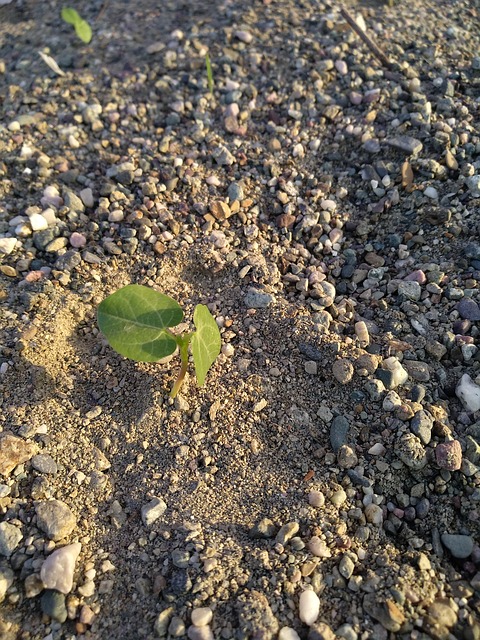Different soils have different textures and properties that may impact what can grow in them, and also how things grow in them.
In this short guide, we outline what might grow well in chalky soil, along with other relevant considerations.
Summary – What Grows Well In Chalky Soil
Chalky soil has it’s own unique traits/properties that makes it different from other types of soils
These traits/properties impact how suitable or unsuitable it is to grow different plants, fruits, vegetables, crops etc. in chalky soils
Some soils may be a chalk mix, which means that it may be predominantly chalk, but also include a certain % of another type of soil as well
This may change the suitability of the soil to grow different things in it, as it isn’t a full chalky soil
There’s different things that can be done to a chalky/peat soil in order to amend it or improve it’s fertility, for the purposes of growing and soil productivity/soil yield
However, some peat soils may never be able to grow certain things
The soil type is only one factor in determining what you can and can’t grow in that soil (or, how effectively something might grow in a specific soil type)
Other factors to consider for growing in different soils include the general soil fertility, and the local conditions and variables such as weather and climate, as just a few major examples
Overall, each square area of soil on an individual plot of land potentially has it’s own unique factors and variables to consider that will impact soil production. And, the same can be said for the soil in the different geographic locations around the world
All chalky soils may have general soil production principles that apply to them, but, may also have unique local variables impacting soil production as well
Profile Of Chalky Soil – Traits, Characteristics, & Features
Chalky soil may have these general features, traits, and characteristics:
– Can be a light or heavy soil
– Is usually an alkaline soil (with a pH level above 7) because of the lime or calcium carbonate found in it or underneath it
– Doesn’t suit the growth of plants that need acidic (below pH 7) or neutral (pH 7) conditions to grow.
– Minerals can leach out of chalky soil quickly, and it drains quite quickly because of the large soil particle size or the rocks sometimes found in it
Adding fertilizer, balancing the pH and adding organic matter can make chalky soil more fertile, more workable and improve moisture retention.
Working With, Improving & Amending Chalky Soil
Read more about working with chalky soil at rhs.org.uk
A Note On Soil Types, & What Ultimately Impacts How Things Grow
Before we look at what grows well in chalky soil, it’s important to note that all soils have a slightly different composition in each geographic location – you might get a mor chalky soil in one location, but in another location you might get a less chalky soil, and this can change it’s characteristics
There are also different external factors acting upon the soil in each geographic area. Climate and weather are a major example of this
Additionally, there are ultimately a range of physical, chemical and biological factors that determine how well something grows in a particular spot or under particular conditions.
Soil fertility is a major factor tied to soil’s physical, chemical and biological traits, that can impact soil productivity and yield. Some soils have high natural fertility, but it’s also possible to modify or increase the fertility of some soils
This is just a guide on chalky soils in general, without going into extreme depth about all these other factors (factors like soil fertility, soil health, soil quality, the impact of adding fertilizers and pesticides, bringing in commercial topsoil, the impact of different tilling practices, and so on).
To assess the soil in an individual location, it can help to become aware of factors like:
– What the soil is, and what is the best way to manage it
– The climate in that location (temperature, rainfall etc.) and the growing seasons (for example – the US has different planting zones),
– The plants or things you want to grow and the conditions they need
This is of course just basic information – it’s important to research beyond these things for each individual situation.
These guides provide some basic information on figuring out what might grow well in different soils, conditions and locations:
All The Factors That Affect The Growth Of Plants
How To Know What Grows In Your Soil Or Garden
How To Know What Grows In Your Geographic Area Or Climate Zone
I Can’t Grow Anything In My Soil – What Do I Do?
Below is a collection of generalized lists of things that may grow well in chalky soil.
It’s important that you don’t rely solely on these lists though – obviously you should do your own additional research, and make your own independent decisions.
What Grows Well In Alkaline Soils?
We’ve already put together a guide on what can grow in alkaline soils.
Trees, Flowers, Plants & Shrubs That Grow In Chalky Soil
Lilac
Weigela
Madonna lilies
Pinks
Mock Oranges
– learn.eartheasy.com
Ceanothus
Campanula
Clematis
Dianthus
Geranium
Lavandula
– rhs.org.uk
Read more about plants suitable for chalky soils at:
Plants For Chalky Soils (rhs.org.uk)
Top 10 Plants For Chalky Soil (theenglishgarden.co.uk)
Vegetables & Crops That Grow In Chalky Soil
Spinach
Beets
Sweet corn
Cabbage
– learn.eartheasy.com
Sources
1. https://learn.eartheasy.com/articles/know-your-garden-soil-how-to-make-the-most-of-your-soil-type/
2. https://www.rhs.org.uk/advice/profile?pid=763
3. https://www.theenglishgarden.co.uk/plants/top-10-plants-for-chalky-soil/
','' ); } ?>